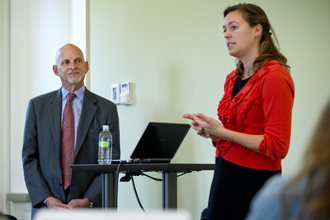Here is a program for students who want to be changemakers
“It's a lofty goal but an important one,” says Rick Aubry developing an academic program to prepare Tulane students who want to bring about positive change in the world.

At a class for students in the social innovation and social entrepreneurship program, Rick Aubry, left, assistant provost, and Stephanie Barksdale, right, manager of social innovation initiatives, lead the discussion. (Photo by Paula Burch-Celentano)
“It takes community engagement work and builds it more deeply into the curriculum,” says Aubry, the assistant provost for civic engagement and social entrepreneurship in the Office of Academic Affairs. A social entrepreneur for 25 years, he joined Tulane last year after post-Katrina trips to help rebuild New Orleans hooked him on the Crescent City.
The community engagement strategy launched by President Scott Cowen after Katrina has been a major draw for prospective students, faculty and leaders interested in participating in New Orleans' rebirth and the university's service-learning initiatives.
“We hope in the near future there will be a full coordinate major in social innovation and social entrepreneurship,” Aubry says, “for undergraduates from throughout the university, regardless of the school they're in, who want to be actively involved in social change.”
An introductory course is under way this fall, with additional courses in the minor starting in the spring such as Introduction to Business Principles, Design Thinking and Leadership for Collective Impact. All the first-level courses are service-learning classes in which students develop projects with community partners related to what they're learning in class.
One particular learning outcome for the new program, Aubry says, is honoring students' passion for changemaking while balancing it with “the reality of how hard it is to make lasting social change.” By being academically rigorous and learning to design new solutions, “students can directly experience the challenges, disappointments and successes” of being social entrepreneurs.
